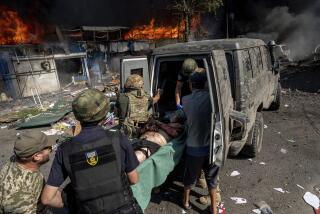Distant Carnage Hits Home : Armenians: An ethnic enclave in Orange County reels from shocking reports of violence against relatives living in a region of the Soviet Union racked by virtual civil war.
- Share via
SANTA ANA — The youngsters at the local Armenian school had just finished their daily prayers this week when principal Lillie Merigian delivered what had become an all-too-grim update on the bloodshed in their homeland.
From out of the group marched one determined second-grader with a message for his instructor: “I’ll go over there and be like Superman and help my people out,” he told her.
Such is the sense of anguish and shaken roots for even those Orange County Armenians with only youthful memories of their homeland as they watch it thrown into a state of widespread violence and virtual civil war.
As Soviet soldiers sought to keep peace Wednesday with orders to fire if attacked, militias from the Muslim Azerbaijani and Christian Armenian communities continued to battle fiercely in the mountainous, disputed region of Nagorno-Karabakh in the southern Soviet Union.
While the local Muslim community has watched the unrest closely, few if any are actually from that area, according to Muzammil Siddiqi, director of the Islamic Society of Orange County.
The local Muslim leader, pointing to tensions that he said have erupted under glasnost after generations of suppression in the region, said: “Hopefully, intelligent people on both sides will try to bring understanding.”
But for about 15,000 Armenians in Orange County, many of them recent emigres who left behind friends and relatives, the ongoing violence, looting and persecution over ethnic and territorial tensions have hit home more directly.
“My grandmother was robbed and my aunt was beaten up,” said Anaheim physician and Armenian refugee Aida Salatinjants, relating recent phone calls with relatives in the Azerbaijani capital of Baku. The relatives have since fled their home of four generations for Moscow.
“These Azerbaijani hoodlums just walked into their home--they knew the name was Armenian--and they broke up the whole place,” said Salatinjants, who left Baku with her husband 10 years ago. “They even stole my grandmother’s false teeth, a 95-year-old woman!”
Local Armenians have begun relief efforts and letter-writing campaigns to the U.S. and Soviet governments in response to the chaotic situation in their homeland. And an organizing panel, the Armenian National Committee of Orange County, is meeting tonight to plan further efforts, which might include political rallies here.
“In many ways, our hands are tied,” said Sylvie Tertzakian of North Tustin, who heads the local Armenian committee. “But we feel we must do something to let people know how angry we are.
“We think it is one of the Soviet (government’s) duties to protect their own citizens, and unfortunately they haven’t been doing that,” she said, voicing a common frustration among local Armenians.
The Azerbaijani militia “want to rid Azerbaijani of all the Armenian elements--by terror,” Tertzakian declared. “This is a clear genocide, today, in 1990.”
Indeed, for many in the local Armenian community, the current strife is all too reminiscent of the massacre and wholesale deportations of their countrymen 75 years ago at the hands of the Ottoman Turks.
“We’re devastated and outraged by what we’re seeing and hearing,” said principal Merigian of the Ari Guiragos Minassian Armenian School in Santa Ana. “To me, this is a horrible replay of what took place (in 1915) when one and a half million Armenians were killed by the Ottomans.”
It is all very difficult to watch,” said the Rev. Moushegh Mardirossian of the Forty Martyrs Armenian Apostolic Church in Santa Ana, of which Merigian’s school is a part. “We hope for peace very soon.”
Merigian, faulting some government and media reports of the conflict, said the battle for the mountainous, agriculturally rich enclave of Nagorno-Karabakh is not the result of religious or ethnic tensions but rather territorial. “It’s a land dispute, people trying to determine their own destiny,” she said.
Whatever its roots, the conflict has brought unimagined chaos.
“Ten years ago, even two years ago, I never thought this could happen--even in a bad dream, I cannot believe it,” said Salatinjants’ husband, Robert, a former lawyer in Armenia who now manages her private medical practice in Anaheim.
“The two peoples (the Armenians and the Azerbaijanis) weren’t 100% good to each other,” he said, “but they lived together; there was nothing like this.”
Salatinjants said his brother and sister, under threat of death, left behind their homes and belongings and fled Baku a few weeks ago for Moscow, although details have been sketchy because of their distrust of telephones.
Still, he sees little reason for hope.
“There is no future there--the future is now,” Salatinjants said. “These people have left behind everything, and there is no hope of returning. Even in 50 years, they could not forgive each other.”
More to Read
Sign up for Essential California
The most important California stories and recommendations in your inbox every morning.
You may occasionally receive promotional content from the Los Angeles Times.










